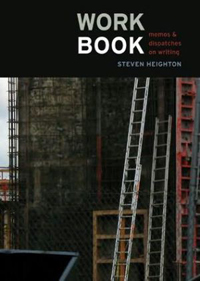Reviews
Nonfiction Review by Michael Kenyon
Steven Heighton, Work Book: memos & dispatches on writing (Toronto: ECW, 2011). Paperbound, 74 pp., $16.95.
Buy this book. Keep it on your bedside table. Buy several copies and give them away. Give a copy to every young writer you know. Give it to every writer you know. Use it in workshops. Take it on a plane journey. Take it fishing. Use it to take your mind off the pain of a hooked finger. Use it as a divining tool. Use it to cut the crap.
And now the review. Bearing in mind that “poets or fiction writers who publish criticism are always striving to clear the ground for their own work.” A book dreams up its reviewer, and dreams up his framework. Will he resist this or not? Is this a book for writers, or will it appeal to a larger audience? Is this review directed at the writer or at the potential reader? There’s a tendency for reviewers to set down the book under review and begin to write in the style of that writer, and since “On Trying to Wear Al’s Shirts” (about Al Purdy and the nature of the mentor relationship) is the final chapter of Work Book, I’m going to give in to that tendency and try on a few of Steven Heighton’s shirts.
“Laughably incomplete,” Heighton says in his introduction, of “every direct statement about the world,” then goes on to give us many such statements in a series of notes, dispatches, essays. Doorways, I guess, is the way I read them. He claims “a form that admits to its own limitation and partiality,” so the places that open up seem friendly, full of heavy or simple weather, annoyingly twisty, or inhospitible to one’s own species. Each of these terse prose moments is also a “dispatch to self,” which means that readers are privy, as with much poetry, to an inner dialogue. This eavesdropping is a lot of fun. We get to see the guts of philosophy, the raw material before it attaches to character (in fiction), or to music and surprise (in poetry). There’s the pleasure of watching a jazz musician improvise within an idiom. Does the book work? Is it work or play? Does it transcend solipsism? Is it restating a goal of poetry by chanting the poet’s inner world? Is it delightful, and not merely instructive? Does any of this matter?
These pieces are pleased with themselves, but not smug, and they delight me, most of the time. They are provocative, in the best sense of that word, and I love the quickness, the deft gestures. It is a clever book, indeed, and funny. For instance, here’s the definition of royalty in “A Devil’s Dictionary for Writers”: “foreign celebrities who earn more in daily investment income than most writers earn in a lifetime.” It is a masculine book, complete with the hurt of insufficient recognition, and the self-effacing laughter that recognizes the callowness of that hurt; it allows nuance as a feminine sprite, a muse, somewhere off in the shadows. A kind of drunkenness, the flight of the wine-mind, flies through the prose. Its energy is affecting.
Work Book is important solace to the poet and the writer of literary fiction, because it speaks to her; yet I believe that if we step back for a wider view, the book will speak to the original creative spark in all of us. It is said that Lao Tzu, on heading into the West, left the gate keeper some notes—“You can’t just vanish!”—and these notes became the Tao Te Ching, a cornerstone of Taoism. Steven Heighton, in love with literature and good writing, more Buddhist than Taoist, is leaving us a similarly paradox-filled midlife message: he is not yet at the gate; he is still parsing ego and grace; death has just been noticed. The final dispatch is about mentoring and competition and, as I’ve said, “on trying to wear Al’s [Purdy] shirts.” Odd thing about this little book is that many readers, like me, will be reading the competition—admiring, disagreeing, nodding—then checking Steven Heighton’s publication credits, matching the number with his age. My goodness, 1961 – . What? He’s been active in five branches of writing and has fifteen, wait, sixteen titles?
Vying with death is described as a fuel for creativity in “Shirts,” and a lot of dead men are alluded to: Birney, Purdy, Leighton, Waugh, Blake, Vidal, Thomas. Heighton asks the reader, and himself (it’s a second-person address): “What do you, the apprentice, feel now in watching the mentor leave?” In other words, how do I feel about closing this book? Well, I feel a bit sad, a little closer to death, or at least the contemplation of death. The horizon is clear, yes, the mentors are behind me for now, Heighton’s book is behind me, but I will have it in my flight bag to return to, open at random, and read. I try it now and get: “Enlightened souls may dispense wise advice, but they seldom write interesting fiction or poetry.” This isn’t quite what I intended to end on, not perhaps what I meant to say, but let it stand.
—Michael Kenyon









